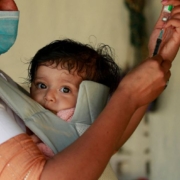The Omicron variant of the coronavirus is causing a dramatic rise in cases of croup, a dangerous respiratory condition usually seen in babies and toddlers, new data suggest. Additionally, new research sheds light on how a tuberculosis vaccine might help protect against COVID-19.
Negotiations on boosting the World Health Organization’s budget to help it prepare for future pandemics made mixed progress last week, with Washington withdrawing criticism but other donors voicing opposition, sources involved in the talks told Reuters.
The U.S. government will run out of supplies of COVID-19 treatments known as monoclonal antibodies as soon as late May and will have to scale back plans to get more unless Congress provides more funding, the White House said on March 15.
Moderna Launches 2nd HIV Trial
AIDS, Clinical Trials, Coronavirus Disease (COVID-19) Pandemic, COVID-19 Vaccinations, HIV, HIV Vaccines, Immune System, Immunogenicity, Messenger RNA (mRNA) Vaccines, Moderna, National Institute of Allergy and Infectious Diseases (NIAID), National Institutes of Health, R&DModerna announced that the first participant was dosed in a Phase I trial of the company’s HIV trimer mRNA vaccine, mRNA-1574.
EXCLUSIVE: U.S. seeks to expand Trump-era COVID data collection under CDC
Breakthrough COVID-19, CDC, Coronavirus Disease (COVID-19) Pandemic, COVID-19 booster shots, COVID-19 shots, Data Tracking, Department of Health and Human Services (HHS), Donald Trump, Hospitalized patients, Hospitals, Infectious Diseases, Joe Biden, National Healthcare Safety Network (NHSN), Patients, Respiratory DiseaseThe Biden administration wants to expand a federal COVID-19 tracking system created during the pandemic to provide a more detailed view of how respiratory and other infectious diseases are affecting patients and hospital resources, according to a draft of proposed rules reviewed by Reuters.
New COVID-19 infections in France rose by more than 25% on March 11 compared to one week earlier after rising more than 24% on March 10, as a downward trend that had started late January reversed.
The Pan American Health Organization (PAHO) on March 9 said COVID-19 cases fell by 26 percent across the Americas during the previous week while deaths from the virus dropped by nearly 19 percent, but cautioned that some effective measures to curb infections should be maintained.
COVID-19 Changed the Biopharma Industry – and There’s No Going Back
Artificial Intelligence, At-Home Testing, BioNTech, Biotech/Biopharma, BNT162b2 (Pfizer and BioNTech), Business, Clinical Trials, Coronavirus Disease (COVID-19) Pandemic, COVID-19 Testing, COVID-19 Vaccines, Messenger RNA (mRNA) Vaccines, Moderna, Nonprofit, Pfizer, Polymerase Chain Reaction (PCR), R&DThe COVID-19 pandemic has had a significant impact on the biopharma industry. From artificial intelligence breakthroughs to at-home genetic testing, BioSpace reviews some of the ways COVID-19 has changed the industry and what we may see in the near future.
Moderna plots vaccines against 15 pathogens with future pandemic potential
Business, Chikungunya virus, Coronavirus Disease (COVID-19) Pandemic, Crimean-Congo hemorrhagic fever (CCHF), Dengue Fever, Ebola, HIV Vaccines, Kenya, Low-Income Countries, Malaria, Marburg Virus, MERS, Middle-Income Countries, Moderna, Mosquito-Borne Infections, National Institutes of Health, Pandemics, Patents, Pathogens, R&D, Vaccines, Viral InfectionsModerna Inc. plans to develop and begin testing vaccines targeting 15 of the world’s most worrisome pathogens by 2025 and will permanently waive the company’s COVID-19 vaccine patents for shots intended for certain low-income and middle-income countries.
Almost a third of people report at least one ongoing symptom between 6 and 12 months after their coronavirus infection, according to a survey of 152,000 people in Denmark.










